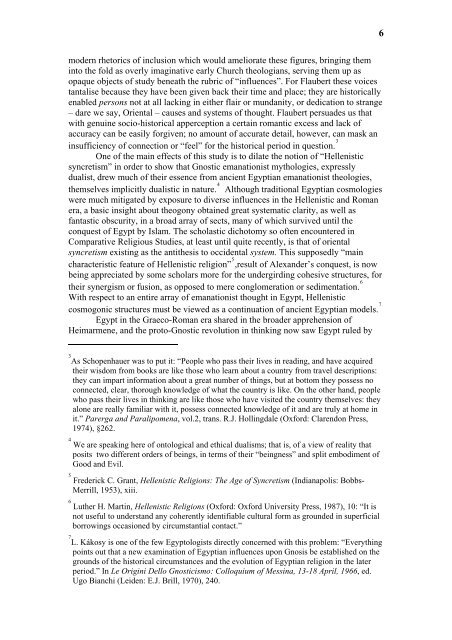THE EGYPTIAN FOUNDATIONS OF GNOSTIC THOUGHT
THE EGYPTIAN FOUNDATIONS OF GNOSTIC THOUGHT
THE EGYPTIAN FOUNDATIONS OF GNOSTIC THOUGHT
You also want an ePaper? Increase the reach of your titles
YUMPU automatically turns print PDFs into web optimized ePapers that Google loves.
modern rhetorics of inclusion which would ameliorate these figures, bringing them<br />
into the fold as overly imaginative early Church theologians, serving them up as<br />
opaque objects of study beneath the rubric of “influences”. For Flaubert these voices<br />
tantalise because they have been given back their time and place; they are historically<br />
enabled persons not at all lacking in either flair or mundanity, or dedication to strange<br />
– dare we say, Oriental – causes and systems of thought. Flaubert persuades us that<br />
with genuine socio-historical apperception a certain romantic excess and lack of<br />
accuracy can be easily forgiven; no amount of accurate detail, however, can mask an<br />
insufficiency of connection or “feel” for the historical period in question. 3<br />
One of the main effects of this study is to dilate the notion of “Hellenistic<br />
syncretism” in order to show that Gnostic emanationist mythologies, expressly<br />
dualist, drew much of their essence from ancient Egyptian emanationist theologies,<br />
themselves implicitly dualistic in nature. 4<br />
Although traditional Egyptian cosmologies<br />
were much mitigated by exposure to diverse influences in the Hellenistic and Roman<br />
era, a basic insight about theogony obtained great systematic clarity, as well as<br />
fantastic obscurity, in a broad array of sects, many of which survived until the<br />
conquest of Egypt by Islam. The scholastic dichotomy so often encountered in<br />
Comparative Religious Studies, at least until quite recently, is that of oriental<br />
syncretism existing as the antithesis to occidental system. This supposedly “main<br />
characteristic feature of Hellenistic religion” 5<br />
,result of Alexander’s conquest, is now<br />
being appreciated by some scholars more for the undergirding cohesive structures, for<br />
their synergism or fusion, as opposed to mere conglomeration or sedimentation. 6<br />
With respect to an entire array of emanationist thought in Egypt, Hellenistic<br />
cosmogonic structures must be viewed as a continuation of ancient Egyptian models. 7<br />
Egypt in the Graeco-Roman era shared in the broader apprehension of<br />
Heimarmene, and the proto-Gnostic revolution in thinking now saw Egypt ruled by<br />
3<br />
As Schopenhauer was to put it: “People who pass their lives in reading, and have acquired<br />
their wisdom from books are like those who learn about a country from travel descriptions:<br />
they can impart information about a great number of things, but at bottom they possess no<br />
connected, clear, thorough knowledge of what the country is like. On the other hand, people<br />
who pass their lives in thinking are like those who have visited the country themselves: they<br />
alone are really familiar with it, possess connected knowledge of it and are truly at home in<br />
it.” Parerga and Paralipomena, vol.2, trans. R.J. Hollingdale (Oxford: Clarendon Press,<br />
1974), §262.<br />
4<br />
5<br />
6<br />
We are speaking here of ontological and ethical dualisms; that is, of a view of reality that<br />
posits two different orders of beings, in terms of their “beingness” and split embodiment of<br />
Good and Evil.<br />
Frederick C. Grant, Hellenistic Religions: The Age of Syncretism (Indianapolis: Bobbs-<br />
Merrill, 1953), xiii.<br />
Luther H. Martin, Hellenistic Religions (Oxford: Oxford University Press, 1987), 10: “It is<br />
not useful to understand any coherently identifiable cultural form as grounded in superficial<br />
borrowings occasioned by circumstantial contact.”<br />
7<br />
L. Kákosy is one of the few Egyptologists directly concerned with this problem: “Everything<br />
points out that a new examination of Egyptian influences upon Gnosis be established on the<br />
grounds of the historical circumstances and the evolution of Egyptian religion in the later<br />
period.” In Le Origini Dello Gnosticismo: Colloquium of Messina, 13-18 April, 1966, ed.<br />
Ugo Bianchi (Leiden: E.J. Brill, 1970), 240.<br />
6










